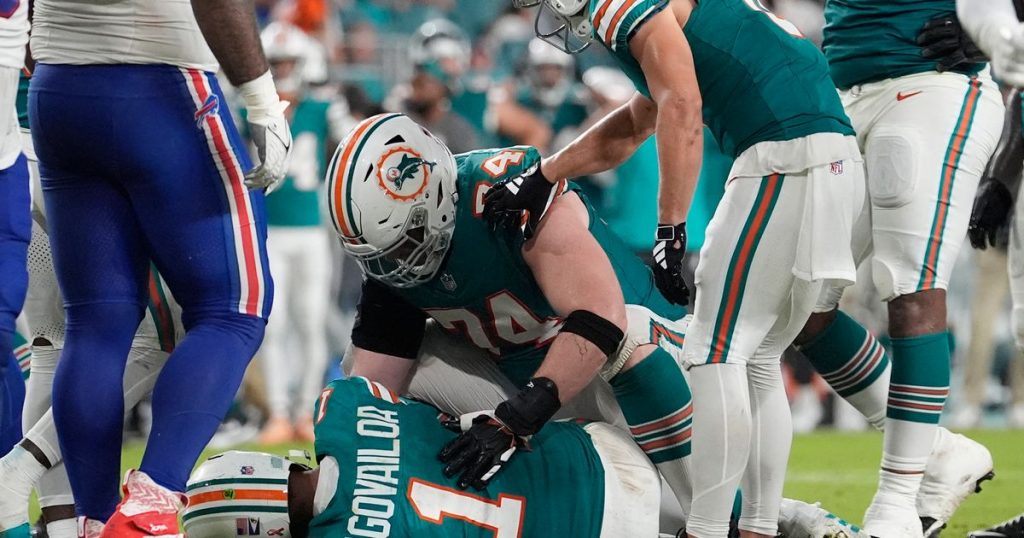Miami Dolphins quarterback Tua Tagovailoa suffered a concussion during a game against the Buffalo Bills on Thursday night. Tagovailoa collided with Bills defensive back Damar Hamlin and hit the back of his head on the turf. He remained down for about two minutes before getting up and walking to the sideline, then heading to the locker room. Tagovailoa has a history of head injuries, having sustained multiple concussions in his first three NFL seasons. Despite this, he signed a lucrative contract extension before the season and was the league’s leading passer in Week 1.
Tagovailoa’s injury occurred during a fourth-down keeper in the third quarter of the game, with the Dolphins trailing 31-10. He went straight into the collision with Hamlin without sliding, leading with his right shoulder instead. Tagovailoa ended up on his back with both hands in the air, prompting immediate concern from players and coaches on both teams. Dolphins center Aaron Brewer quickly signaled to the sideline that there was an injury, and Dolphins coach Mike McDaniel kissed Tagovailoa on the cheek as he departed the field. Skylar Thompson replaced Tagovailoa in the game.
Damar Hamlin, the Bills player involved in the collision with Tagovailoa, had previously suffered a cardiac arrest during a game in January 2023, causing the NFL to suspend play. The incident was a terrifying moment that occurred in front of a national television audience. During this current game against the Dolphins, Hamlin was involved in another impactful collision, this time causing Tagovailoa to suffer a concussion. The severity of the injury and its impact on Tagovailoa’s future performance and earnings remain to be seen.
As a young and promising quarterback in the NFL, Tua Tagovailoa’s concussion raises concerns about the potential long-term effects and risks associated with head injuries in football. The Dolphins are likely to prioritize Tagovailoa’s health and well-being in determining his return to play. With his history of concussions and the significant investment made in him by the team, there will be careful considerations made regarding his recovery and potential return to the field. The unpredictability of concussions and their consequences underscores the importance of player safety and injury prevention in professional sports.
Despite the setback of his concussion, Tua Tagovailoa had been enjoying a productive and injury-free season leading up to the game against the Bills. He had shown significant improvement and potential in his performance, throwing for a league-best 4,624 yards and signing a lucrative contract extension before the season. The timing of his injury could impact his future prospects and opportunities in the league, depending on the severity of the concussion and his recovery timeline. His absence from the game against the Bills highlighted the vulnerability and physical risks that come with playing professional football, especially as a quarterback in a physically demanding sport.
The immediate aftermath of Tua Tagovailoa’s concussion underscores the importance of player safety and medical evaluation in sports. The NFL has implemented strict protocols and procedures for handling head injuries and concussions, with teams and medical staff following established guidelines to ensure the well-being of players. Tagovailoa’s injury serves as a reminder of the physical risks associated with football and the need for continued research and prevention efforts to protect athletes from the potential long-term effects of head trauma. As he undergoes evaluation and treatment for his concussion, Tagovailoa’s health and future in the league will be closely monitored by the Dolphins organization and the broader NFL community.








